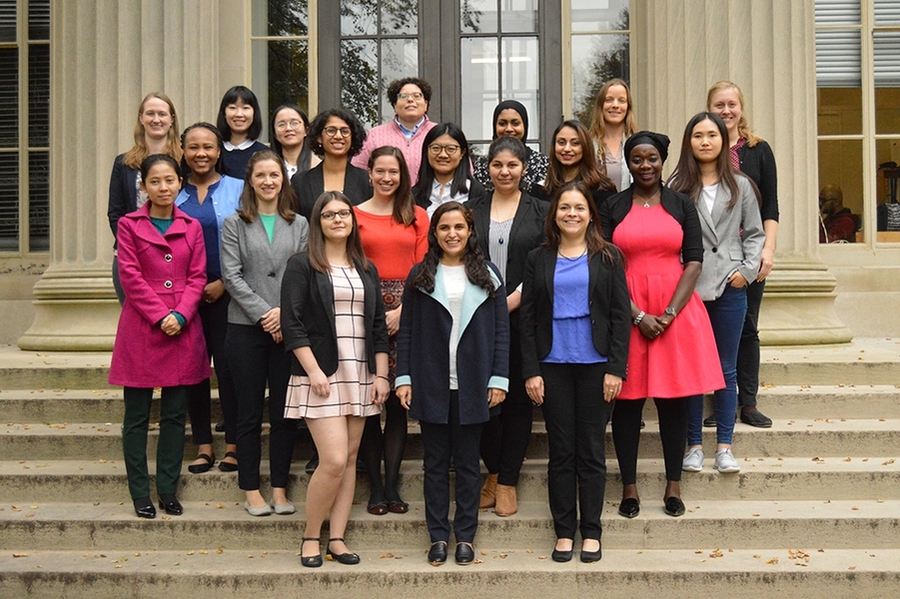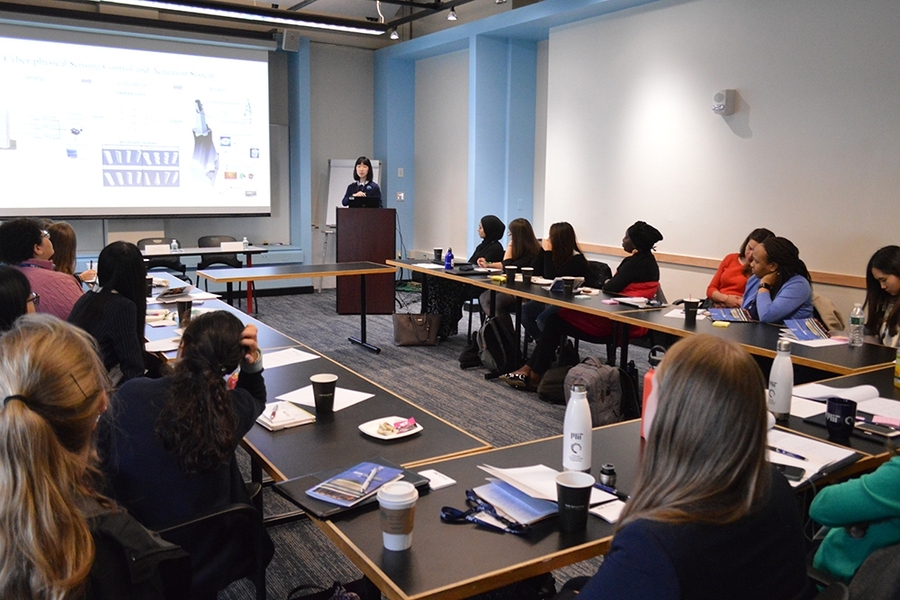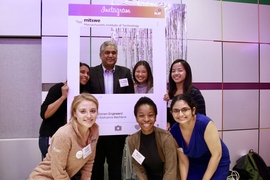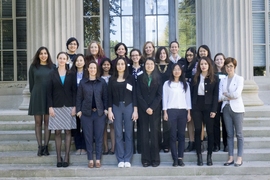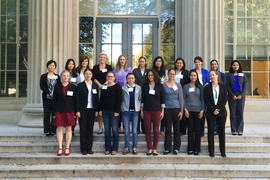Women in STEM can find it more challenging to navigate an academic career path simply because it has not been well traveled to date. MIT is working to change this with a well-designed map.
On October 24 and 25, The MIT Department of Civil and Environmental Engineering (CEE) hosted its third Civil and Environmental Engineering Rising Stars Workshop, bringing together 20 distinguished early-career women interested in careers in academia. The workshop included research presentations, an hour-long mentoring discussion with MIT Chancellor Cynthia Barnhart, four panel discussions on building an academic career, and lots of networking opportunities.
This year’s 20 participants came from around the globe, selected from an applicant pool of 73 women by a steering committee of MIT faculty, led by Colette Heald, professor in CEE and in the MIT Department of Earth, Atmospheric and Planetary Sciences. “Women are under-represented in the STEM faculty ranks,” said Heald, “and the late graduate student, early postdoc time is critical to deciding on future career directions. We hope that the workshop will help demystify the process of applying for faculty positions and becoming a successful faculty member.” Other members of the steering committee included Institute Professor Sally "Penny" Chisholm, who is based in CEE; Heidi Nepf, MacVicar Faculty Fellow and professor of CEE; Tal Cohen, professor of CEE; Franz-Josef Ulm, professor of CEE; and Bori Stoyanova, CEE’s human resource administrator.
Dean of the MIT School of Engineering Anantha Chandrakasan opened the workshop sharing the history of the Rising Stars event and noting that five of the current department heads in the School of Engineering are women. Research presented by the participants at this year’s CEE workshop involved transportation systems, drinking water vulnerability, the impact of climate change on agriculture, emissions control strategies, energy, and more.
Advice, insight on building academic careers
MIT Chancellor Cynthia Barnhart, the CEE Ford Professor of Engineering, sat down with the workshop group to discuss her own career and answer questions. She described how the challenges she faced became more complicated over time, moving beyond the design of algorithms to issues involving public policy. When asked whether she’d ever had doubts along the way, Barnhart said: “Every time I’ve taken a new job, I’ve accepted wondering ‘Can I be successful at this job?’ And that seems right to me — if you have no doubts, you probably aren’t realizing your potential.”
The four workshop panels, made up of MIT faculty members, covered the job search and interview process, successfully navigating the first few years of a faculty career, work-life balance, and specific challenges facing women in academia.
McAfee Professor of Engineering and CEE department head Markus Buehler kicked off the first panel, which included Nepf, Dave Des Marais, and Ali Jadbabaie, by explaining in detail the components of MIT’s hiring process. He described what a strong application should look like, what a strong recommendation letter should include, what could be expected during interviews, and more. Nepf sat down with participants and described the key interview questions they should expect (including, “What’s your most significant result? What will you do when you come here?”) and offered insights about how to approach answering them.
Daniella Saetta, a PhD candidate in environmental engineering in the School of Sustainable Engineering at Arizona State University, described the job search/interview panel as “the most valuable one for me because that's where I am right now, applying for jobs. The description of the MIT hiring process was really good. A lot of the time, we don't get specifics about one school’s process. Even if I'm not going to be applying to MIT, having a specific process that I can then compare to others is really useful.”
The second panel explored the tenure process. Panelist Franz-Joself Ulm described the process as “scary and stressful,” and emphasized the importance of seeking faculty mentors who could “help you frame the narrative you need to have for tenure.” Much of this second panel, and the group discussion after, centered on time management, how to prioritize multiple obligations around teaching, research, personal, and family life. “You have to set up and follow strict rules to maintain work-life balance,” explained Heald. “For example, I don’t answer emails after 8 pm, which helps me sleep better.” During the third panel, on work-life balance, Professor Jesse Kroll told the group: “I’m better at my job when I’m happy and doing the outside activities I enjoy.”
Addressing specific challenges women face
The workshop’s final panel explored specific issues facing women. Heald said, “one big challenge women face is the lack of [female] mentors. There just aren’t that many models for you to follow.” Heald pushed back against this particular challenge by creating a support network of other women in her field to share insights and support.
“We need to acknowledge the implicit bias and structural barriers that impact women in academia,” said panelist Caitlin Mueller. Nepf raised two additional challenges: “women are socialized never to ask for anything for ourselves. Get over that, and ask for what you need” and suggested that “automatically saying yes to everything you’re asked is a big mistake. Take time to think about it and get comfortable saying no.” A CEE Rising Stars attendee in 2015, Cohen addressed the imposter syndrome many women faculty experience: “At the beginning of your career, you may not feel like a professor. It’s a transition that will take time.”
Networking to create a cohort of rising stars
The workshop was filled with opportunities for the 20 women to network over coffee breaks, lunches, campus tour, dinner with MIT faculty, and more. As Heald explains, creating a cohort of women to become the next generation of academic leaders is a key workshop goal: “The under-representation of women in academia can make it challenging for women to identify successful models and mentors with similar career experiences. For that reason, a network of peers can be particularly helpful. That’s a big part of CEE Rising Stars.”
Nadine Borduas-Dedekind, who attended the workshop in 2015 and is currently a lecturer at ETH-Zurich, said her “most valuable experience was meeting like-minded women interested in careers in academia and uncertain about how to achieve that. I met exceptionally intelligent, talented, and ambitious women from many different fields of engineering who had similar concerns about insecurities, children, family, jobs, mobility, and more. I was inspired and encouraged to know that I wasn’t alone.”
Nicole Jackson, a PhD candidate at the University of Illinois at Urbana-Champaign who attended this year, shared a similar experience: “It's been really valuable to meet with my peers. CEE is incredibly diverse and the breadth of technical content that's been covered here has been really impressive. Meeting women who are leading some of these fields that are very different from my own has been a really wonderful experience. We need more events like this.”
